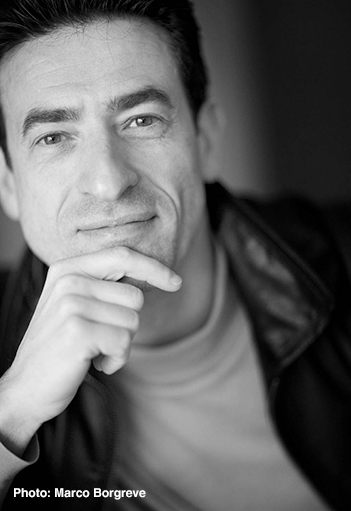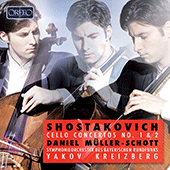Yakov Kreizberg
The younger brother of the conductor Semyon Bychkov, Yakov Kreizberg had his first piano lessons at the age of five and studied conducting privately with Ilya Musin, professor of conducting at Leningrad Conservatory, before emigrating to the USA in 1976. He was awarded fellowships to study conducting at Tanglewood with Bernstein, Ozawa and Leinsdorf, and at the Los Angeles Philharmonic Institute; and was subsequently invited back to Los Angeles to work as assistant to Michael Tilson Thomas. Kreizberg won the Eugene Ormandy Prize for conducting from the University of Michigan, held the post of music director of the Mannes College Orchestra in New York from 1985 to 1988, and took first prize in the Leopold Stokowski Conducting Competition in 1986. He returned to Europe in 1988 to take up the position of chief conductor of the Krefeld and Mönchengladbach Opera and Niedrrheinischer Symphony Orchestra, the youngest person to hold such a post at that time in Germany. In an interview with Bruce Duffie, he described graphically some of the issues which a conductor at this stage of his or her career must tackle: ‘It’s hard enough to make music out of Mozart, but taking a third-rate operetta, which people don’t take seriously anyway, which has horrible traditions and is usually sung very badly, taking that and being disciplined about it and making something out of it is incredibly hard, and you learn a lot doing it.’
Soon Kreizberg began to develop an international career: he made his debut at the BBC Promenade Concerts in 1993 with the BBC Symphony Orchestra (returning the following year with the Australian Youth Orchestra) and left Krefeld in 1994 to take up the post of chief conductor at the Komische Oper in Berlin, where he worked closely with the German stage director Harry Kupfer on several notable productions. He was awarded the Kritikerpreis für Musik by the German music critics for his achievements at the Komische Oper and toured Japan with the company during 1997. He began a successful five-year term as chief conductor of the Bournemouth Symphony Orchestra in 1995, a post which he held in parallel with that of chief conductor of the Jeunesses Musicales Orchestra, and also conducted at the Glyndebourne Festival Opera with notable success (Jenůfa 1992, Don Giovanni 1995, Kát’a Kabanová, 1998). He summarised succinctly the benefits of working at Glyndebourne in the interview already quoted: ‘…the working conditions are simply the best in the world. We have seven or eight weeks for staging and we have the London Philharmonic. The company really cares what goes on. You’re in the middle of a beautiful countryside with no time to be interested in anything else and the only close place to go is London. So you’re likely to spend all your time in Glyndebourne thinking about your work and doing it. It’s a marvellous setting. Very beautiful.’
After leaving the Komische Oper in 2001 Kreizberg was appointed chief conductor of the Netherlands Philharmonic Orchestra and the Netherlands Chamber Orchestra in 2003, in the same year also becoming principal guest conductor of the Vienna Symphony Orchestra. As a guest conductor he has appeared with the main European and American symphony orchestras, as well as several major opera companies such as the Chicago Lyric Opera; and took over the Philadelphia Orchestra’s North and South American tour from Wolfgang Sawallisch in 2003.
Kreizberg is undoubtedly one of the leading conductors of his generation. On the podium his style is athletic but clear, with a wide and descriptive baton technique. His interpretations are uniformly convincing, displaying a fine mixture of emotional commitment and technical finish; and his approach to interpretation, as described to Bruce Duffie, is strongly personal: ‘I know that the piece of music will only live if it is recreated by a creative mind. There is no such thing as an authentic interpretation of any of those pieces. Having done them with the composers present and having often asked whether what I was doing was right or not, or getting criticism from them for what I was doing, I sometimes did things completely different from what was notated. I discussed with them why I was doing it and they often agreed, or suggested that my feelings were correct and it was better that way. This led me to believe that one mustn’t simply follow blindly every single marking. The notes, yes. But tempo indications and dynamics and things like that are suggestions which the composer at the time passionately believes are in the best interest of the performance. But when preparing it, there can be other ideas and considerations.’ Although Kreizberg’s discography is not large, it contains an unusual range of works, indicative of his individuality and character as a conductor. He stands directly in the line of the great European maestri of the past.
© Naxos Rights International Ltd. — David Patmore (A–Z of Conductors, Naxos 8.558087–90).

















